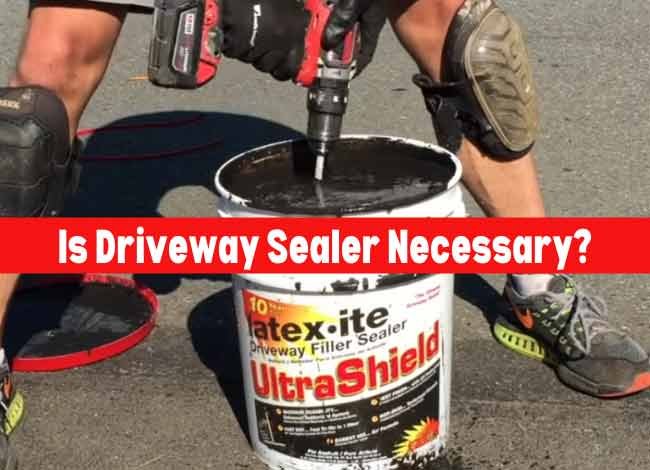Last Updated on April 21, 2025
This is one of the most discussed topics in driveway sealer forums. Some homeowners strongly support it, while others believe it’s unnecessary. From our experience, sealing your driveway offers more advantages than drawbacks. So, if you’re wondering whether to seal your driveway or not, we highly recommend it to enhance its durability and appearance.
However, the final decision is yours. That’s why we’ve broken down both the benefits and potential drawbacks of sealing your driveway. Keep reading to make an informed choice.
Why You Should Seal Your Driveway
1. Improves Durability
Sealing your driveway offers protection from harsh elements such as water, UV rays, excess heat, and erosion. Whether your driveway is made of asphalt or concrete, sealing it helps prevent cracks, fading, and deterioration.
Without a protective seal, small cracks can quickly expand into larger gaps or potholes, which not only make your driveway unsightly but can also pose safety risks. Sealing helps slow this process and extends the overall life of your driveway.
2. Shields Against Harmful Chemicals
Vehicle fluids such as oil, gas, and brake fluid can degrade an unsealed asphalt surface. These chemicals break down the asphalt binder, leading to structural damage over time.
While removing oil stains from driveways has become easier with modern products, it’s still better to prevent them from penetrating in the first place. A good sealer acts as a protective barrier, making it easier to clean spills and reducing long-term damage.
3. Enhances Curb Appeal
A freshly sealed driveway looks darker, cleaner, and more polished—greatly improving your home’s overall appearance. Unsealed driveways, on the other hand, often appear faded and worn out.
In addition, sealing your driveway can boost your property value. If you’re considering selling your home, a well-maintained driveway creates a positive first impression and can increase resale value.
4. Easier to Clean
Sealed driveways are smoother, which makes sweeping, washing, and removing debris much easier. Cracks and holes trap dirt and moisture, but sealing fills these gaps and creates a clean, even surface.
Before sealing, always repair any cracks or potholes to maximize the effectiveness of the sealer and ensure a long-lasting finish.
5. Safer and Smoother Surface
A smooth, sealed driveway offers better traction and is safer for walking, driving, and playing. It also prevents water from pooling in low spots or cracks, reducing the chances of slipping during rainy weather.
Why You Shouldn’t Seal Your Driveway
1. Requires Ongoing Maintenance
One downside of sealing your driveway is the need for periodic maintenance. Most sealers require reapplication every 2–3 years, depending on weather conditions and usage. Neglecting to reseal can lead to the surface looking uneven or worn out.
2. Additional Costs
Sealing isn’t a one-time cost. Along with the initial application, you’ll need to budget for resealing and occasional repairs such as filling cracks or potholes. Over time, these costs can add up, making sealed asphalt driveways more expensive to maintain than some unsealed concrete alternatives.
That’s why some homeowners prefer installing a concrete driveway, which may not require sealing unless you want to enhance its appearance or add extra protection.
💡 Related article: How Long it takes to dry the driveway sealer?
What’s the Best Time to Seal the Driveway?
Asphalt Driveway
If you’ve recently installed a new asphalt driveway, you should allow it to cure for at least six months before applying any sealer. The best time to seal an asphalt driveway is during warm, dry weather. This is because the sealant cures and bonds more effectively in higher temperatures.
For optimal results:
- Check the weather forecast before sealing. You’ll need at least three consecutive days of dry weather—not just one.
- After applying the sealant, allow it to dry for 24 to 48 hours.
- Avoid sealing when rain or high humidity is expected, as this can prevent proper curing and reduce the lifespan of the sealant.
When done in the right conditions, a high-quality asphalt sealer can last up to 15 years, but it’s still recommended to reapply every 3 years to maintain water resistance and surface protection. Also, make sure to clean your driveway regularly to enhance the sealer’s effectiveness.
Concrete Driveway
Unlike asphalt, concrete driveways don’t require sealing to function well—but applying a sealer can still offer significant protection and aesthetic improvements.
Sealing your concrete driveway:
- Extends its durability
- Prevents staining from oil, gasoline, and water
- Enhances the surface appearance
Concrete sealers differ from asphalt ones. The best sealer for concrete driveways is a penetrating sealer, made from special resins that soak into the concrete and form a chemical barrier. Some popular options include:
- Stamped Concrete Sealer – for decorative finishes
- High-Gloss Concrete Sealer – for a shiny, polished look
- Tinted Concrete Sealer – to add color and UV protection
While concrete sealing is easier than asphalt sealing, it typically requires annual resealing to maintain a great look and strong protection.
Conclusion
In summary, sealing your driveway is a smart maintenance decision, whether it’s made of asphalt or concrete. For asphalt driveways, sealing is essential to protect against water, sun damage, and wear and tear. For concrete driveways, sealing enhances longevity, appearance, and resistance to stains and chemicals.
So, if you’re wondering whether it’s necessary to seal your driveway, the answer is a firm YES. It not only boosts the curb appeal but also protects your investment for the long term.
✅ Choose the right type of sealer based on your driveway
✅ Apply it during dry, warm weather
✅ Reseal every 3–5 years for asphalt and annually for concrete
✅ Keep the surface clean and maintained
Taking these simple steps will ensure your driveway stays strong, beautiful, and protected for years to come.

